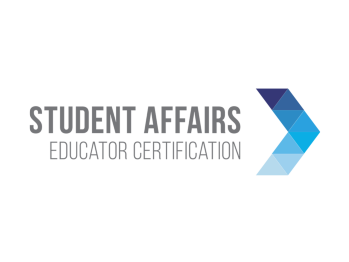About Core Certification
About Certification
The Higher Education Consortium for Student Affairs Certification promotes and advances student affairs and services in higher education by assessing and recognizing individual educators who demonstrate competency in established domains, commit to ongoing learning and professional development, and comply with the code of ethics. The Consortium was collaboratively established by student affairs professional associations to manage Student Affairs Educator Certification.
Certification is designed to benefit individual educators at the mid-level and above, higher education institutions, and the larger student affairs and services profession. There have traditionally been limited means for educators to demonstrate their competencies and knowledge growth through ongoing work experience, and to then formally exhibit this growth in pursuit of lifelong learning and professional advancement. Certification offers a robust set of credentials to demonstrate this growth!
Informational Videos
Check out the videos below to learn more about various aspects of the new Student Affairs Educator Certification program and its development. Learn more about the benefits to individual educators, associations, institutions, and the profession as a whole.
About Specialty Certifications
Student Affairs Educator Certification includes seven credentials–the core student affairs educator certification and six specialty area certifications. The core certification serves as an important, independent credential as well as a required prerequisite for each specialty certification. All credentials were developed by subject matter expert practitioners and graduate faculty appointed by the Certification Consortium partner associations to benefit individual educators, institutions, professional associations, and the field.
|
|
||
|
|
|
Becoming Certified
In order to become CSAEd certified, interested professionals must apply through the Higher Education Consortium for Student Affairs Certification. Bothe the Consortium and NASPA have gathered a variety of resources and reference materials to help candidates prepare for the core certification exam.
Higher Education Consortium for Student Affairs Certification References
-
CSAEd Self-Study Guide
-
Certificant List: List of people who have taken and passed the exam who are willing to share their experience
Exam Preparation
NASPA Resources for Continuing Education and Maintaining Certification
Certification maintenance includes ethical practice and continuous learning. While certificants are required to demonstrate continuous learning through recertification every five years, engaging in certification maintenance is an ongoing process. A certificant’s maintenance period begins once they become certified or upon approval of recertification. Certificants must recertify every five years to maintain active certification status. During this five year period, certificants should be seeking and engaging in the variety of approved continuing education activities. NASPA provides a number of resources to assist with this process.
“I primarily work with faculty and faculty-administrators and certification is common in many academic fields. So, the certification adds a certain amount of credibility to what I do in the eyes of those who often do not understand student affairs.
The feedback I received at the completion of the certification process provided me with a more concrete idea of the competencies in which I excel and areas I can grow. To me, this is where the certification process is phenomenal for mid-level administrators. I have a better sense of how I might shape future professional development opportunities to maximize competency growth. It is a map of sorts so I can continue to grow as a professional.”
-
Dr. Justin M. Sipes, Director, Center for Community-Based Learning. University of North Florida






